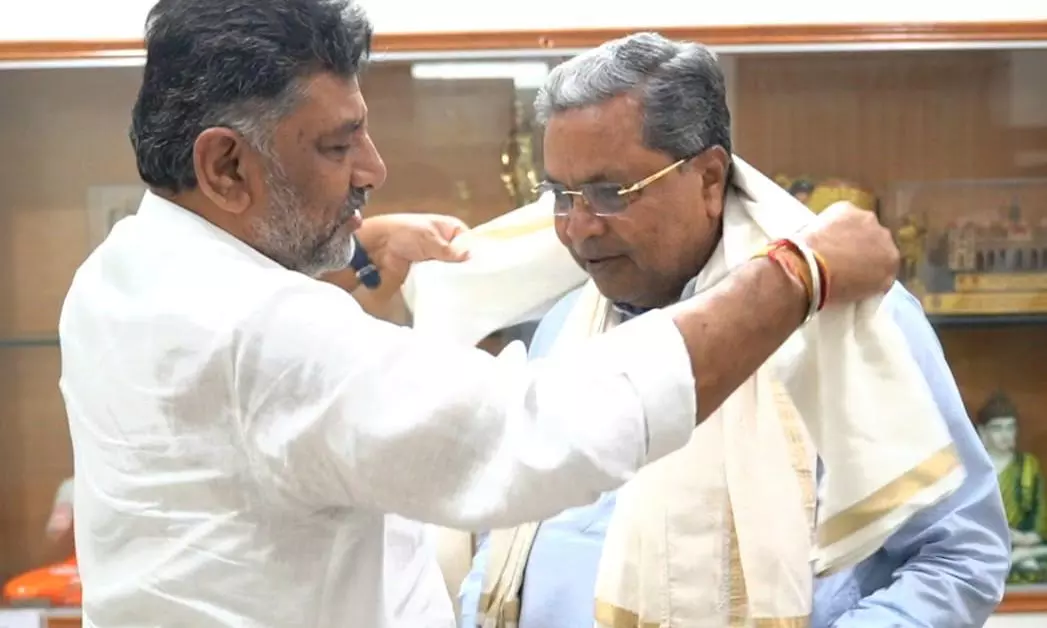
A year as CM: Braving drought, blast, infights to build Brand Siddaramaiah
Siddaramaiah has been walking a tightrope ever since he took charge of the state a year ago amid stiff opposition from senior party colleagues

His party enjoys a safe majority in the Assembly but there is no end to the pinpricks Chief Minister Siddaramaiah has faced as he begins his second year helming the Congress government in Karnataka.
Aides and political observers say Siddaramaiah has been walking a tightrope ever since he took charge of the state a year ago amid stiff opposition from senior party colleagues.
But no one can take away from the 75-year-old veteran the credit for giving the Congress a solid cloak by embracing welfare politics and secular values.
Brand Siddaramaiah
This is the reason the Congress considered him a safe bet for the ongoing Lok Sabha battle. He is seen as a perfect blend of development agenda and social engineering — the best vote aggregator who can take on the aggressive Hindutva narrative.
“Siddaramaiah, with his acumen, has handled every crisis diplomatically and succeeded in building Brand Congress and Brand Siddaramaiah,” said Congress leader Kondajji Mohan.
Another colleague, HC Mahadevappa, agreed that the chief minister had encountered numerous challenges — from his own colleagues as well as the opposition. “(He) will complete his full tenure,” Mahadevappa told The Federal.
Modi government
Siddaramaiah has also had to face a combative Central government led by Prime Minister Narendra Modi, who has not forgotten that the Congress took power in Karnataka despite his aggressive electioneering for the BJP.
While the Congress government was ready to bear the financial implications of its welfare schemes promised to the voters, it was not prepared for the natural calamity that struck Karnataka last year.
Karnataka has not seen a drought of this magnitude in the last few decades. Of the 236 taluks, 226 have been declared drought-hit.
Drought war
The state government sought Rs 18,171-crore assistance but the Centre refused to budge. Even after Karnataka moved Supreme Court, the Centre released a paltry Rs.3,454 crore.
This, of course, gave Siddaramaiah a reason to accuse the Modi government of bias and the BJP’s 25 outgoing MPs of not fighting for Karnataka’s interests.
Predictably, this became an issue in the Lok Sabha elections.
Challenges within
Allegations of bribery hurled by an association of contractors played a role in unseating the earlier BJP government. But contractors’ leader D Kempanna embarrassed Siddaramaiah by alleging that corruption has continued in Karnataka. The chief minister promptly released a part of the dues owed by the government to the contractors.
A bomb blast at the famed Rameshwaram Café in Bengaluru, blamed on Islamists, and the murder of a Hindu woman in Hubbali by a young Muslim man put strain on the Karnataka government.
Siddaramaiah was also forced to cross hurdles created by some of his party leaders, including Basavaraja Rayareddi, BR Patil, and BK Hariprasad.
Deputy Shivakumar
Although Siddaramaiah’s love-hate relationship with his deputy chief minister DK Shivakumar is no secret in political circles, they presented a façade of unity in the run-up to the Lok Sabha elections.
But their staunch supporters have been openly airing their differences, each camp targeting the leader of the rival group.
Cooperation Minister Rajanna has floated the idea of having three more deputy chief ministers. This proposal is seen as a bid by the Siddaramaiah camp to checkmate Shivakumar.
Multiple flare-ups
Even his critics appreciate Siddaramaiah for not belying the expectations of the people by implementing a slew of populist schemes soon after taking charge.
But just when the Siddaramaiah government was riding high on a feel-good factor, it was hit by flare-ups on multiple fronts.
Politically, differences among Congress leaders came to the fore when B K Hariprasad accused Siddaramaiah of being anti-Dalit. He wanted G Parameshwar, a Dalit, made a deputy chief minister.
Dalit politics
When the Congress issued a notice to Hariprasad, he got the support of Parameshwar and Priyank Kharge, son of Congress president Mallikarjun Kharge.
Now, reports of dissident activity have resurfaced in the ruling party, especially among Dalit legislators.
Dalit MLAs and leaders are convening meetings to push the demand for increased representation to their communities within the administration. Meanings are also being read behind the meetings between PWD Minister Satish Jarkiholi and Home Minister Parameshwar.
Checkmating rivals
Both Jarkiholi and Parameshwar are aspirants for higher positions in the government. Their repeated meetings have triggered speculations of brewing dissidence in the party.
The Congress has reportedly told Siddaramaiah and Shivakumar to take steps to address the grievances of the discontented legislators.
Siddaramaiah reportedly does not want Shivakumar to become the chief minister — as reportedly decided in the power-sharing agreement — if the Congress wins 20-plus Lok Sabha seats.
Caste census
“The ultimate test for the Congress government will come on June 4 when the results of the Lok Sabha polls are declared,” said a senior Congress leader.
Karnataka’s much-talked-about caste census has been another tricky area. Siddaramaiah’s decision to accept it sparked a virtual caste war in the state. Leaders of the dominant Lingayat and Vokkaliga communities are particularly against it. The chief minister first put it off until the Lok Sabha polls. Later, he resolved to present the census report to the Cabinet.
For now, however, the census issue remains an unresolved challenge.
